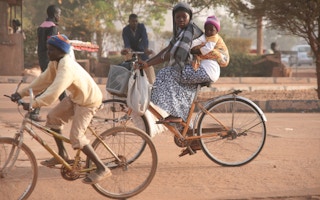A couple of social enterprises in Switzerland announced on Thursday a new partnership that allows companies and concerned individuals to offset their carbon emissions by sending bicycles to African countries.
To continue reading, subscribe to Eco‑Business.
There's something for everyone. We offer a range of subscription plans.
- Access our stories and receive our Insights Weekly newsletter with the free EB Member plan.
- Unlock unlimited access to our content and archive with EB Circle.
- Publish your content with EB Premium.
Emissions reduction firm South Pole Carbon and bicycle provider Gump- & Drahtesel - both recipients of the World Economic Forum’s Schwab Foundation’s Social Entrepreneur of the Year award - have teamed up to provide offset options for consumers who want to make an impact in Africa.
Firms and ordinary persons can calculate their carbon footprint, or the amount of emissions generated due to day-to-day activities and consumption, on South Pole Carbon’s website and offset this quantity with carbon credits, which they can purchase through investing in projects like Gump- & Drahtesel’s programme, Bicycles for Africa.
The sale of these credits mitigate climate change and help boost other sustainable development goals of the programme.
Previously, the Bicycles for Africa project works through the donation of cash, old bicycles, and through volunteer work. Residents from any part of Switzerland can give away their unwanted bikes to the organisation instead of adding them to the country’s waste. Gump- & Drahtesel recycles the bikes, whether improving it or ‘upcycling’ its parts into other products like lamps and décor, by employing jobless Swiss citizens.
“
Compared to a motorbike, three tonnes of CO2 are saved with every exported bike. Every tonne of CO2 reduced in this project is matched with a verified Gold Standard credit.
South Pole Carbon
The social business is dedicated to this work integration agenda, giving the unemployed opportunities to re-join the labour market and overcome social exclusion and stigmatization. By working with Gump- & Drahtesel, they are trained as bicycle mechanics recycling the two-wheelers or as retail clerks selling the finished items.
In the same way, Gump- & Drahtesel provides livelihood to Africans in Burkina Faso, Eritrea, Tanzania, Ghana, Gambia, Ivory Coast and Madagascar. Around 12,000 restored bicycles are exported to these countries to be sold at low prices. By promoting cycling in Africa, the enterprise stated in their website that the bicycles “assure income and generate jobs in bicycle workshops and within the local bicycle and spare parts trade”.
Not only that, the bicycles “allow local mobility independent of petrol and carbon dioxide emissions”. The use of bicycles also aids Africans in traveling to other villages and going to school and work, enabling them to attain education and make a better living. According to Gump- & Drahtesel, the recycled bikes “result in a contribution toward poverty reduction”.
With the South Pole Carbon partnership, this increases even further, said Paolo Richter, general manager of the Bicycles for Africa programme. He said, “Both companies pursue the same goals. Thanks to this cooperation, even more people in Africa will get access to a bicycle and therefore to affordable mobility.”
Prior to the collaboration, South Pole Carbon’s projects ranged from renewable energy to forestry, and waste management to water purification. Their portfolio centres on high-quality emission-reduction projects which meet various international standards such as the Gold Standard (GS), Verified Carbon Standard (VCS) and Social Carbon, among others. These certification schemes seek to verify the sustainable development benefits of projects and compliance to other rigorous criteria.
South Pole Carbon said of the Bicycles for Africa programme: “Compared to a motorbike, three tonnes of CO2 are saved with every exported bike. Every tonne of CO2 reduced in this project is matched with a verified Gold Standard credit.”
Considering the bike project’s annual shipment, this translates to 36,000 tonnes of reduced carbon emissions.
Renat Heuberger, chief executive officer of South Pole Carbon, said, “To protect the climate and support the local population simultaneously is at the heart of all our 300 CO2-cutting projects around the world. Bicycles for Africa is a wonderful example.”
Even transporting the bikes from Switzerland to Africa “makes sense ecologically,” according to Gump- & Drahtesel. They said, “The production of new bicycles consumes far more energy and resources than the recycling process including the shipping to Africa. Given the high quality of Swiss bikes, they will be in use for another ten to twenty years on the African continent.”








